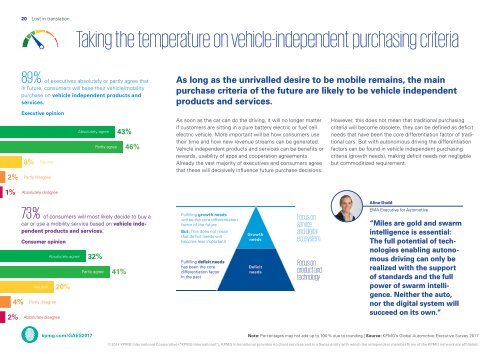Global Automotive Executive Survey 2017
global-automotive-executive-survey-2017
global-automotive-executive-survey-2017
Create successful ePaper yourself
Turn your PDF publications into a flip-book with our unique Google optimized e-Paper software.
20 Lost in translation<br />
Taking the temperature on vehicle-independent purchasing criteria<br />
2%<br />
89 %<br />
of executives absolutely or partly agree that<br />
in future, consumers will base their vehicle/mobility<br />
purchase on vehicle independent products and<br />
services.<br />
<strong>Executive</strong> opinion<br />
8%<br />
Neutral<br />
Partly disagree<br />
Absolutely agree<br />
Partly agree<br />
43%<br />
46%<br />
As long as the unrivalled desire to be mobile remains, the main<br />
purchase criteria of the future are likely to be vehicle independent<br />
products and services.<br />
As soon as the car can do the driving, it will no longer matter<br />
if customers are sitting in a pure battery electric or fuel cell<br />
electric vehicle. More important will be how consumers use<br />
their time and how new revenue streams can be generated.<br />
Vehicle independent products and services can be benefits or<br />
rewards, usability of apps and cooperation agreements.<br />
Already the vast majority of executives and consumers agree<br />
that these will decisively influence future purchase decisions.<br />
However, this does not mean that traditional purchasing<br />
criteria will become obsolete, they can be defined as deficit<br />
needs that have been the core differentiation factor of traditional<br />
cars. But with autonomous driving the differentiation<br />
factors can be found in vehicle independent purchasing<br />
criteria (growth needs), making deficit needs not negligible<br />
but commoditized requirement.<br />
1% Absolutely disagree<br />
4%<br />
73 %<br />
of consumers will most likely decide to buy a<br />
car or use a mobility service based on vehicle independent<br />
products and services.<br />
Consumer opinion<br />
Neutral<br />
Partly disagree<br />
2% Absolutely disagree<br />
Absolutely agree<br />
20%<br />
32%<br />
Partly agree<br />
41%<br />
Fulfilling growth needs<br />
will be the core differentiation<br />
factor of the future<br />
But: This does not mean<br />
that deficit needs will<br />
become less important!<br />
Fulfilling deficit needs<br />
has been the core<br />
differentiation factor<br />
in the past<br />
Growth<br />
needs<br />
Deficit<br />
needs<br />
Focus on<br />
service<br />
and digital<br />
ecosystem<br />
Focus on<br />
product and<br />
technology<br />
Aline Dodd<br />
EMA <strong>Executive</strong> for <strong>Automotive</strong><br />
“Miles are gold and swarm<br />
intelligence is essential:<br />
The full potential of technologies<br />
enabling autonomous<br />
driving can only be<br />
realized with the support<br />
of standards and the full<br />
power of swarm intelligence.<br />
Neither the auto,<br />
nor the digital system will<br />
succeed on its own.”<br />
kpmg.com/GAES<strong>2017</strong><br />
Note: Percentages may not add up to 100 % due to rounding | Source: KPMG’s <strong>Global</strong> <strong>Automotive</strong> <strong>Executive</strong> <strong>Survey</strong> <strong>2017</strong><br />
© <strong>2017</strong> KPMG International Cooperative (“KPMG International”). KPMG International provides no client services and is a Swiss entity with which the independent member firms of the KPMG network are affiliated.



